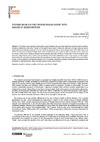Identificador persistente para citar o vincular este elemento:
https://accedacris.ulpgc.es/handle/10553/42379
| Campo DC | Valor | idioma |
|---|---|---|
| dc.contributor.author | Alvarez Gil, Francisco Jose | en_US |
| dc.date.accessioned | 2018-11-06T09:37:39Z | - |
| dc.date.available | 2018-11-06T09:37:39Z | - |
| dc.date.issued | 2018 | en_US |
| dc.identifier.issn | 1886-2438 | en_US |
| dc.identifier.uri | https://accedacris.ulpgc.es/handle/10553/42379 | - |
| dc.description.abstract | In the present study, samples of late Modern English scientific texts have been analysed to evaluate cases of epistemic modality as realised by modal verbs. The aim of this research was to detect if there exist variances in the way modals are used in historical texts from a gender perspective. For this, I have interrogated the Corpus History English Texts (1700-1900) which is part of The Coruña Corpus of English Scientific Texts, which contains history texts written by male and female authors. I have used the Coruña Corpus Tool for retrieval, although manual analyses have been carried out as well. Each of the occurrences found have been categorised according to their contextual meanings. The results obtained account for a high frequency on the usage of these modal verbs according to gender and the diverse pragmatic functions these modal verbs accomplish in the communicative process, such as mitigation and negative politeness. From a pragmatic perspective, epistemic modals have the potential to allow negotiation of meaning between writers and their audience among other functions. | en_US |
| dc.language | eng | en_US |
| dc.publisher | 1886-2438 | |
| dc.relation.ispartof | Revista de Linguistica y Lenguas Aplicadas | en_US |
| dc.source | Revista de Linguística y Lenguas Aplicadas [ISSN 1886-2438], v. 13, p. 13-20 | en_US |
| dc.subject | 620202 Análisis literario | en_US |
| dc.subject.other | Epistemic meaning | en_US |
| dc.subject.other | Modality | en_US |
| dc.subject.other | Modal verbs | en_US |
| dc.subject.other | Early Modern English | en_US |
| dc.title | Epistemic modals in early modern English history texts. Analysis of gender variation | en_US |
| dc.type | info:eu-repo/semantics/Article | es |
| dc.type | Article | es |
| dc.identifier.doi | 10.4995/rlyla.2018.7801 | |
| dc.identifier.scopus | 85054825332 | |
| dc.identifier.isi | 000438482700002 | |
| dc.contributor.authorscopusid | 57204183086 | |
| dc.description.lastpage | 20 | - |
| dc.description.firstpage | 13 | - |
| dc.relation.volume | 13 | - |
| dc.investigacion | Artes y Humanidades | en_US |
| dc.type2 | Artículo | en_US |
| dc.contributor.daisngid | 2861253 | |
| dc.contributor.wosstandard | WOS:Gil, FJA | |
| dc.date.coverdate | 2018 | |
| dc.identifier.ulpgc | Sí | es |
| dc.description.sjr | 0,118 | |
| dc.description.sjrq | Q3 | |
| dc.description.sellofecyt | Sello FECYT | |
| dc.description.esci | ESCI | |
| dc.description.fecytq | Q2 | |
| dc.description.fecytpuntuacion | 33,29 | |
| dc.description.dialnetimpact | 0,0 | |
| dc.description.dialnetq | Q2 | |
| dc.description.dialnetd | D4 | |
| dc.description.erihplus | ERIH PLUS | |
| item.fulltext | Con texto completo | - |
| item.grantfulltext | open | - |
| crisitem.author.dept | GIR Discourse, Communication and Society | - |
| crisitem.author.dept | Departamento de Filología Moderna, Traducción e Interpretación | - |
| crisitem.author.orcid | 0000-0002-8752-9091 | - |
| crisitem.author.parentorg | Departamento de Filología Moderna, Traducción e Interpretación | - |
| crisitem.author.fullName | Álvarez Gil, Francisco José | - |
| Colección: | Artículos | |
Citas SCOPUSTM
3
actualizado el 08-jun-2025
Citas de WEB OF SCIENCETM
Citations
5
actualizado el 08-jun-2025
Visitas
140
actualizado el 27-jul-2024
Descargas
104
actualizado el 27-jul-2024
Google ScholarTM
Verifica
Altmetric
Comparte
Exporta metadatos
Los elementos en ULPGC accedaCRIS están protegidos por derechos de autor con todos los derechos reservados, a menos que se indique lo contrario.
